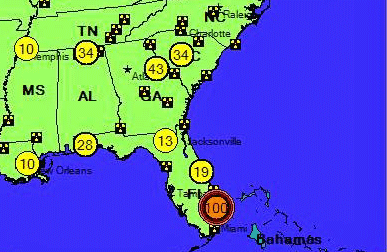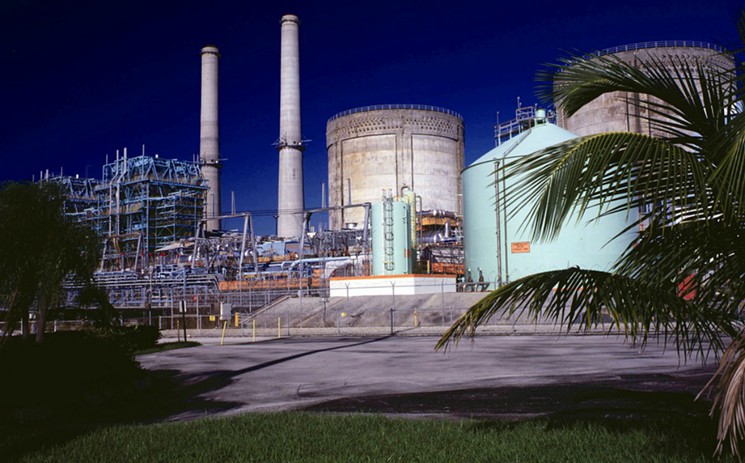TURKEY POINT NUCLEAR PLANT IS PUMPING POLLUTED WATER INTO BISCAYNE BAY
Health Nut News wrote about this 2 years ago and were even mentioned by some bigger health sources, for bringing up a subject few wanted to discuss.

Above: Photo I posted in my article in 2014 about this dangerous plant and radiation levels here in Florida!
(Most available update 12 p.m.: FPL responded to the study, saying it needs more time to review the specific data but defending its efforts to protect Biscayne Bay. “Our top priority is the health and safety of the public, and there is no threat to the health and safety of the public,” says Bianca Cruz, an FPL spokeswoman, reports Miami New Times.)
When Florida Power & Light finalized plans to expand nuclear reactors at Turkey Point three years ago, critics like us weren’t happy (we wrote about this in 2014!). The nuclear plant, which is currently on environmentally fragile land, would threaten the ecosystem if production increased.
Sadly, we were right; Tuesday morning, the county released the results of a study they did on whether Turkey Point has been leaking wastewater into Biscayne Bay(I know I don’t have to tell you how dangerous this is). County water monitors found levels of tritium (a radioactive isotope) at more than 200 times the normal level, in the bay water. This is another blow for Florida Power & Light who recently lost a state court ruling (last month) when a judge found they had failed to prevent hundreds of thousands of gallons of wastewater from seeping into the bay.
From the Miami New Times article:
“‘This is one of several things we were very worried about,’ says South Miami Mayor Philip Stoddard, who is also a biological sciences professor at Florida International University. ‘You would have to work hard to find a worse place to put a nuclear plant, right between two national parks and subject to hurricanes and storm surge.'”
Local government officials are scrambling to figure out just how threatened the Bay is currently. “I was shocked to read this,” says Commissioner Xavier Suarez, who in a letter demanded answers from FPL “by the end of the day”, reports Miami New Times.
State Rep. Jose Javier Rodriguez feels that state regulators haven’t taken this issue seriously for years, and have therefore put people and the environment in serious danger. At the center of the issue is a system of canals surrounding the plant in Miami-Dade. The canals circulate water through the plant to help leach heat off the reactors which must be constantly cooled in order to avoid meltdowns.
When FPL was preparing to expand their reactors in 2013, critics warned that relying on the canals was a mistake; environmentalists argued that the hot, salty canal water would inevitably leak back into Biscayne Bay and the Everglades. In two years, heat levels in the canals have spiked and salty water has been found as far as four miles inland, through groundwater.
It is unclear whether the elevated tritium levels are dangerous to people or wildlife at their current concentrations, so more studies need to be done. But what is known is that the hot, salty water is a huge problem for the delicate ecosystems in the Everglades and in Biscayne National Park. Mayor Stoddard believes at this point that there are only two solutions: build new cooling towers and get rid of the canals or shut down the plant.
More from the article:
“FPL spokeswoman, points out the agency reached an accord with the county last October. In the agreement, FPL promises to clean up its act by pumping wastewater into a deep aquifer, among other steps. ‘We’ll continue to comply with regulatory agreement we reached with the county in October,’ Cruz says. Cruz also emphasized that FPL has collected its own data on impacts to Biscayne Bay and has seen no indication of a larger pollution problem(Oh I’m sure). ‘We’ve collected this data for many years, and this data has reviewed by independent scientists,’ Cruz says. ‘We’re going to continue to work closely with regulatory agencies.'”
Since we’ve already been concerned about this AND reported on it two years ago, we will continue to watch this issue closely and keep you informed.
Source: Miami New Times












